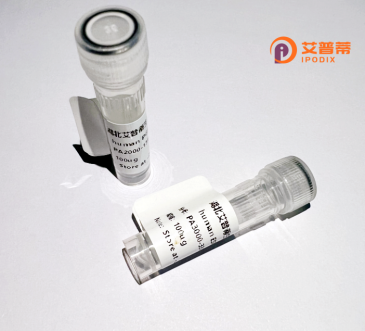
| 纯度 | >90%SDS-PAGE. |
| 种属 | Human |
| 靶点 | CCNF |
| Uniprot No | P41002 |
| 内毒素 | < 0.01EU/μg |
| 表达宿主 | E.coli |
| 表达区间 | 1-786aa |
| 氨基酸序列 | MGSGGVVHCRCAKCFCYPTKRRIRRRPRNLTILSLPEDVLFHILKWLSVEDILAVRAVHSQLKDLVDNHASVWACASFQELWPSPGNLKLFERAAEKGNFEAAVKLGIAYLYNEGLSVSDEARAEVNGLKASRFFSLAERLNVGAAPFIWLFIRPPWSVSGSCCKAVVHESLRAECQLQRTHKASILHCLGRVLSLFEDEEKQQQAHDLFEEAAHQGCLTSSYLLWESDRRTDVSDPGRCLHSFRKLRDYAAKGCWEAQLSLAKACANANQLGLEVRASSEIVCQLFQASQAVSKQQVFSVQKGLNDTMRYILIDWLVEVATMKDFTSLCLHLTVECVDRYLRRRLVPRYRLQLLGIACMVICTRFISKEILTIREAVWLTDNTYKYEDLVRMMGEIVSALEGKIRVPTVVDYKEVLLTLVPVELRTQHLCSFLCELSLLHTSLSAYAPARLAAAALLLARLTHGQTQPWTTQLWDLTGFSYEDLIPCVLSLHKKCFHDDAPKDYRQVSLTAVKQRFEDKRYGEISQEEVLSYSQLCAALGVTQDSPDPPTFLSTGEIHAFLSSPSGRRTKRKRENSLQEDRGSFVTTPTAELSSQEETLLGSFLDWSLDCCSGYEGDQESEGEKEGDVTAPSGILDVTVVYLNPEQHCCQESSDEEACPEDKGPQDPQALALDTQIPATPGPKPLVRTSREPGKDVTTSGYSSVSTASPTSSVDGGLGALPQPTSVLSLDSDSHTQPCHHQARKSCLQCRPPSPPESSVPQQQVKRINLCIHSEEEDMNLGLVRL |
| 分子量 | 114 KDa |
| 蛋白标签 | GST-tag at N-terminal |
| 缓冲液 | 0 |
| 稳定性 & 储存条件 | Lyophilized protein should be stored at ≤ -20°C, stable for one year after receipt. Reconstituted protein solution can be stored at 2-8°C for 2-7 days. Aliquots of reconstituted samples are stable at ≤ -20°C for 3 months. |
| 复溶 | Always centrifuge tubes before opening.Do not mix by vortex or pipetting. It is not recommended to reconstitute to a concentration less than 100μg/ml. Dissolve the lyophilized protein in distilled water. Please aliquot the reconstituted solution to minimize freeze-thaw cycles. |
以下是关于重组人周期素F(CCNF)蛋白的3篇代表性文献及其摘要:
---
1. **文献名称**:*Cyclin F suppresses B-Myb activity to promote cell cycle checkpoint control*
**作者**:D’Angiolella, V., et al.
**摘要**:研究发现CCNF作为SCF(Skp1-Cul1-F-box)泛素连接酶复合物的底物识别亚基,通过调控转录因子B-Myb的稳定性,维持S期和G2/M期的转换检查点。CCNF缺失导致基因组不稳定性和肿瘤发生风险增加。
---
2. **文献名称**:*Cyclin F-mediated degradation of CP110 controls centrosome duplication and mitotic fidelity*
**作者**:Bassermann, F., et al.
**摘要**:该文献揭示CCNF通过泛素化降解中心体蛋白CP110.调控中心体复制和纺锤体组装。重组人CCNF蛋白实验表明其功能异常会导致有丝分裂错误,与癌症发生相关。
---
3. **文献名称**:*Structural and functional analysis of the human Cyclin F protein*
**作者**:Kolanowski, T.J., et al.
**摘要**:通过重组表达纯化人CCNF蛋白,解析其三维结构并鉴定其与SCF复合物及底物的相互作用界面,为靶向CCNF的药物设计提供了结构基础。
---
4. **文献名称**:*Cyclin F mutations disrupt degradation of phosphorylated BRCA1 and increase breast cancer risk*
**作者**:Teixeira, L.K., et al.
**摘要**:研究指出CCNF通过调控BRCA1磷酸化修饰后的降解,维持DNA损伤修复功能。CCNF突变导致BRCA1积累和基因组不稳定,可能与家族性乳腺癌遗传易感性相关。
---
以上文献涵盖了CCNF在细胞周期调控、肿瘤发生及结构功能等领域的关键作用。
Cyclin F, encoded by the *CCNF* gene, is a member of the cyclin protein family, which plays a pivotal role in cell cycle regulation. Unlike classical cyclins (e.g., cyclin B or D) that activate specific cyclin-dependent kinases (CDKs), cyclin F lacks direct kinase activation capacity. Instead, it functions as a substrate recognition component of the SCF (Skp1-Cul1-F-box) ubiquitin ligase complex, targeting proteins for proteasomal degradation via its F-box domain. This protein is crucial for maintaining genomic stability by regulating the abundance of key cell cycle effectors, including DNA replication factors (e.g., CDC6), mitotic kinases (e.g., CDK1), and oncoproteins. Cyclin F expression peaks at the G2/M phase, coordinating timely progression through mitosis and ensuring proper DNA repair prior to cell division. Dysregulation of cyclin F has been implicated in cancer, where its mutations or altered expression may disrupt cell cycle checkpoints, leading to uncontrolled proliferation or genomic instability. Recent studies also highlight its potential role in neurodegenerative diseases, possibly linked to impaired protein degradation pathways. Research into cyclin F continues to uncover its complex regulatory networks, offering insights into therapeutic strategies for cancers and other disorders associated with cell cycle dysregulation.
×